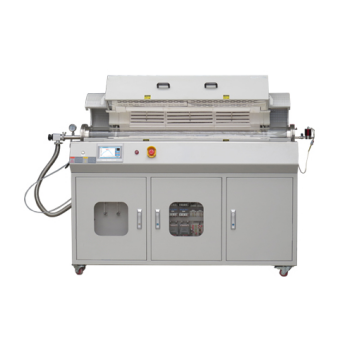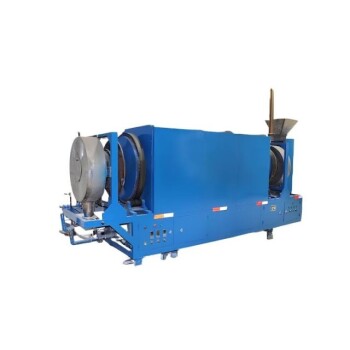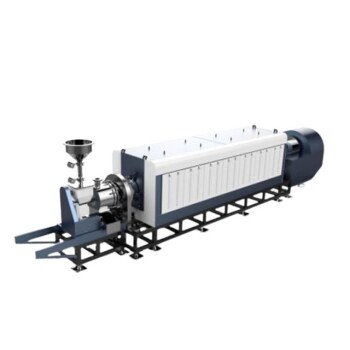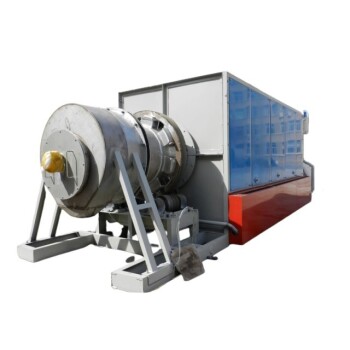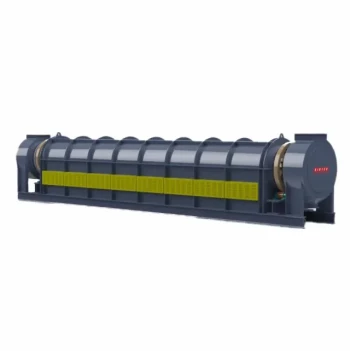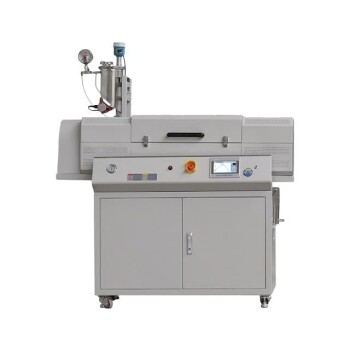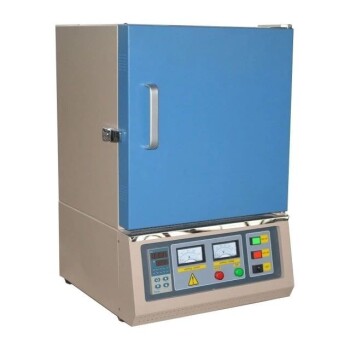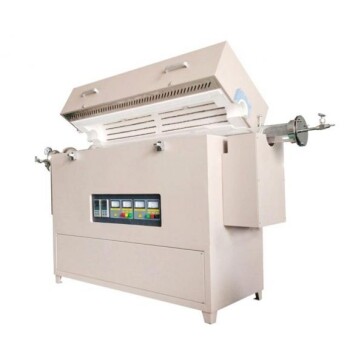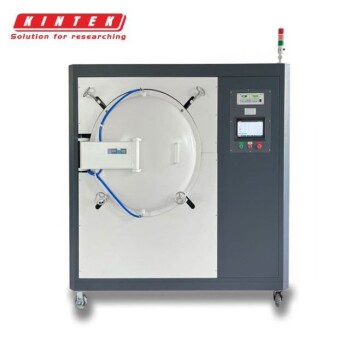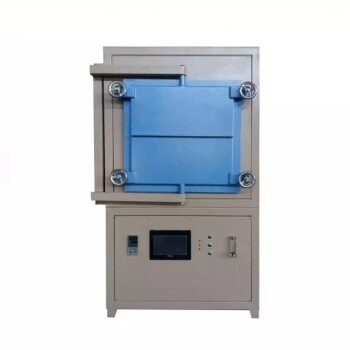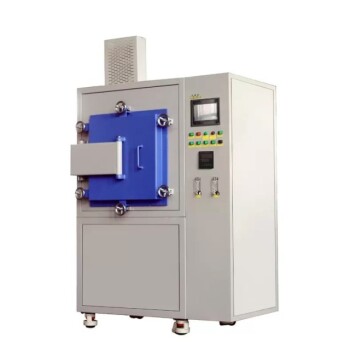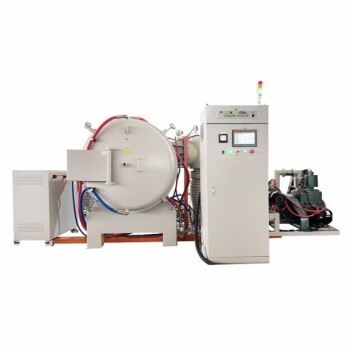At its core, a rotary kiln's construction is a story of two distinct layers: the external structural shell and the internal protective lining. The outer shell is most commonly made from carbon steel, but can also be constructed from stainless steel, specialty alloys, or abrasion-resistant (AR) steel depending on the specific operational demands. This steel cylinder is then lined with refractory materials, typically insulating brick, which can withstand the extreme internal conditions.
The selection of a rotary kiln's materials is not a one-size-fits-all decision. The outer steel shell is chosen for structural strength and external conditions, while the internal refractory lining is selected specifically to withstand the intense heat and chemical reactions of the process within.
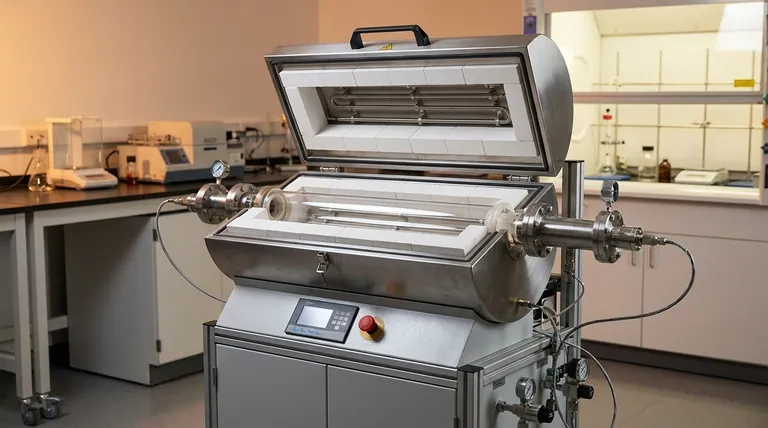
The Two-Layer System: Shell and Lining
A rotary kiln is not a single piece of material. It is an engineered system where each layer serves a distinct and critical purpose.
The Outer Shell: Providing Structural Integrity
The large, rotating cylindrical tube you see is the kiln's shell. Its primary job is to provide the structural form and strength to contain the process and endure the mechanical stresses of rotation.
The choice of steel is dictated by the environment and process:
- Carbon Steel: The most common and cost-effective choice for standard applications with moderate temperatures.
- Abrasion-Resistant (AR) Steel: Used in sections or for entire shells where the feed material is highly abrasive, preventing premature wear.
- Stainless Steel & Specialty Alloys: Chosen for high-temperature applications or when the outer shell is exposed to corrosive atmospheres. Indirectly-fired kilns, which are heated from the outside, often require these advanced alloys to maintain strength at elevated temperatures.
The Refractory Lining: Enduring the Extremes
The true workhorse of the kiln is the internal refractory lining. This layer is what directly contacts the processed material and protects the steel shell from thermal and chemical damage.
This lining must possess three key properties:
- Thermal Stability: It must withstand incredibly high process temperatures (often exceeding 1450°C or 2640°F in cement kilns) without melting or degrading.
- Corrosion Resistance: It must resist chemical attack from the raw feed, intermediate products, and hot gases inside the kiln.
- Mechanical Strength: It must be durable enough to handle the abrasive, tumbling action of the solid materials as the kiln rotates.
Key Factors Driving Material Selection
The engineering decision for which materials to use is a careful balance of process needs and operational realities.
Operating Temperature
Temperature is the single most important factor. As process temperatures increase, the material specifications for both the refractory lining and the steel shell become more demanding and expensive.
Chemical Corrosiveness
The chemical nature of the material being processed dictates the type of refractory required. An acidic process requires an acidic refractory, while a basic process (like cement manufacturing) requires a basic refractory to prevent rapid chemical erosion.
Abrasiveness of the Feed Material
Highly abrasive feeds, such as minerals and certain wastes, will physically wear down the refractory lining. In these cases, a harder, more abrasion-resistant brick is selected, and AR steel may be considered for the shell to prolong service life.
Firing Method (Direct vs. Indirect)
In a direct-fired kiln, the flame and combustion byproducts are inside the shell, placing the entire thermal and chemical burden on the refractory lining. In an indirect-fired kiln, the shell is heated from the outside. This places immense thermal stress on the shell itself, necessitating the use of specialty alloys that retain their strength at very high temperatures.
Understanding the Trade-offs
Selecting kiln materials involves balancing competing priorities. An uninformed choice can lead to premature failure and costly downtime.
Cost vs. Longevity
High-performance alloys and premium refractory linings carry a significant upfront cost. However, for demanding applications, this initial investment often results in a lower total cost of ownership by extending the kiln's operational life and reducing the frequency of major maintenance.
Thermal Expansion Mismatch
The steel shell and the refractory bricks expand at different rates when heated. The design of the kiln must accommodate this differential movement to prevent the lining from buckling or the shell from experiencing catastrophic stress.
Weight vs. Strength
A thicker, more robust shell and a denser lining increase durability but also add immense weight. This requires larger, more powerful support structures (trunnions and rollers) and a more robust drive system, impacting the overall cost and footprint of the installation.
Making the Right Choice for Your Goal
The optimal material combination is directly tied to the kiln's intended purpose.
- If your primary focus is processing abrasive, non-corrosive materials at moderate temperatures: A carbon or AR steel shell with a durable, hard refractory lining is likely the most cost-effective solution.
- If your primary focus is high-temperature calcination with corrosive elements: A stainless steel or specialty alloy shell with a chemically-resistant, high-alumina refractory is essential for operational reliability.
- If your primary focus is a specialized process in an indirect-fired kiln: The shell material itself is the primary barrier, demanding a specialty alloy engineered to handle extreme external heat and prevent product contamination.
Ultimately, the right material choice ensures the rotary kiln is not just a container, but a precisely engineered reactor optimized for its specific industrial task.
Summary Table:
| Component | Common Materials | Key Properties |
|---|---|---|
| Outer Shell | Carbon Steel, AR Steel, Stainless Steel, Specialty Alloys | Structural strength, corrosion resistance, abrasion resistance |
| Refractory Lining | Insulating Brick, High-Alumina Refractories | Thermal stability, corrosion resistance, mechanical strength |
Ready to optimize your rotary kiln for superior performance? At KINTEK, we leverage exceptional R&D and in-house manufacturing to provide advanced high-temperature furnace solutions, including custom rotary kilns tailored to your specific needs. Our products, such as Rotary Furnaces, Vacuum & Atmosphere Furnaces, and CVD/PECVD Systems, are designed with deep customization capabilities to precisely meet unique experimental requirements. Contact us today to discuss how we can enhance your process efficiency and durability—get in touch now!
Visual Guide

Related Products
- Split Multi Heating Zone Rotary Tube Furnace Rotating Tube Furnace
- Electric Rotary Kiln Continuous Working Small Rotary Furnace Kiln for Pyrolysis Plant Heating
- Electric Rotary Kiln Small Rotary Furnace Biomass Pyrolysis Plant Rotating Furnace
- Electric Rotary Kiln Small Rotary Furnace for Activated Carbon Regeneration
- Electric Rotary Kiln Pyrolysis Furnace Plant Machine Small Rotary Kiln Calciner
People Also Ask
- What are the main structural components of a rotary furnace? Explore Key Parts for Efficient Material Processing
- What are some industrial applications of rotary tube furnaces? Boost Your Material Processing Efficiency
- What factors should be considered when selecting a tube for a rotary tube furnace? Ensure Optimal Performance and Longevity
- What supplementary features can enhance rotary tube furnace performance? Boost Efficiency with Precision Control
- What is the purpose of the rotation mechanism in a rotary tube furnace? Achieve Uniform Heating and Enhanced Process Control
